Review: Crypto for People Who Don’t Follow Crypto.
When I read the article in the 1729 post by “Jon Stokes”, the subheading stood out to me:
“A normie-friendly, buzzword-free argument for why crypto will change the world.”
It stood out to me because Jon Stokes promised to explain the main points of crypto in a structured manner and only with the most necessary technical-jargon, unlike most of the articles posted in news-papers currently. Buzzwords get thrown around, like sandwiches during a food fight in high school, uncontrolled, messy and no one really understands what is going on. Everyone just assumes that the core ideas of “decentralization” are so clear to everyone and we continue the professional conversation of “DeCrAiBu”. “DeCrAiBu” is my abbreviation for Decentralized Crypto AI Bullshit. Btw I like the idea of owning my domain, because I can just write words like Bullshit and Btw. Even though it is not professional, my point is being delivered clearly and simply. Exactly, what Jon managed to do, explain why crypto will change the world, in a simple manner, exactly for people like me: Normies.
Why is this so important? These normie-friendly explanations manage to break the extremely difficult topics down into a simple and structured way, so that everyone can figure out the big ideas step-by-step. For me personally, I re-read the article multiple times, because with every idea I understood, more interesting questions came to my mind and I started exploring the concepts in depth.
Thus, this is a proposed extension to the article with questions from a normie who really wants to understand why crypto will change the world and is not afraid (but a little ashamed) to ask the stupid questions.
However, before I start into my questions I want to bring two passages to your attention. These passages are from the article that show that we are still in the beginning and we should not assume that we already know HOW and WHEN crypto will change the world. YES, Version 1.0 is being deployed, but what lies ahead is much bigger and will really unbundle society. That is why it is so important to ask these first principal questions now. Even normies like me must try to understand how we can use this technology to navigate and build a new society:
1: “Once version 1.0 has unbundled and reconfigured all of online content, commerce, and community, then future versions of the decentralized economy will come even faster.”
2: “Banks are massively larger and more important in terms of their institutional power and centrality to our way of life than printers ever were. When this insanely consolidated, over-levered, politically invincible loses its grip on the basic plumbing of finance, it will be a way bigger deal than the advent of the Web. More along the lines of the Catholic Church losing its grip on government and culture with the rise of the printing press.”
The questions will be structured in 3 parts, from the broader topics to the nitty gritty stuff. For some of the questions I will try to propose answers, for other ones I will not. If you want to join this conversation, send me a message and I will add you to our 1729 discord channel.
Part 1: Why Decentralization?
Jon Stokes already explained in a beautiful manner on why Decentralized Finance (DeFi) is a game changer. If you have not read his article, go do it now. Basically, it all boils down to a basic structure. Due to smart contracts two unknown parties, who entered into a transaction, can be sure that both will fulfill what they promised to do. Also, everything is verifiable once the transaction is complete. So, Trust & Transparency.
Now you might ask, okay but as a normie I do not really get scammed, so trust & transparency is a “nice to have” but currently my purchases and transactions also works fine. Give me an example where I would need that in the real world? Why is decentralization really better than centralization?
Let’s look at 3 sectors: Decentralized Finance, Government, Commerce.
1.1 Decentralized Finance:
In the case of decentralized finance I totally understand it (I hope). Due to the missing overhead of control and intermediaries, costs are cut and better rates can be offered. Additionally, anyone can exchange funds from everywhere with anyone, anywhere. A lot of anyeveryones in the last sentence there, but you get the point.1.2 Government:
In the case of governments I also seem to understand the argument for decentralization. As Milton Fridman put it: “I can spend somebody else’s money on somebody else. And if I spend somebody else’s money on somebody else, I’m not concerned about how much it is, and I’m not concerned about what I get. And that's the government”. So governments do not try to optimize and thus decentralization with an open and trusted record of transactions (blockchain) is useful as a transparent control mechanism for the people.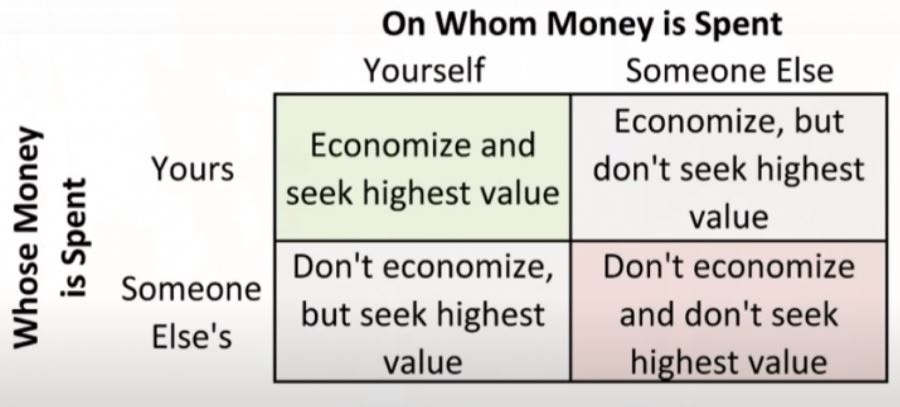
1.3 Commerce:
Unfortunately I am not fully convinced of why commerce should be decentralized for example. What would be the GREAT benefit for the customer, if Amazon was decentralized? Why would someone switch to a decentralized platform rather then buy at Amazon?There are many definitions on “why” companies exist and what their purpose is, but let’s go with the most basic one: To optimize for profits over a longer period of time. And how do companies do that? By providing customers with the highest value (best price, best service, etc.). So companies already optimize for their customers, otherwise no one will pay money and the company will die.
From an online store like Amazon, the user expects (Low Prices & Fast/Trusted Delivery).
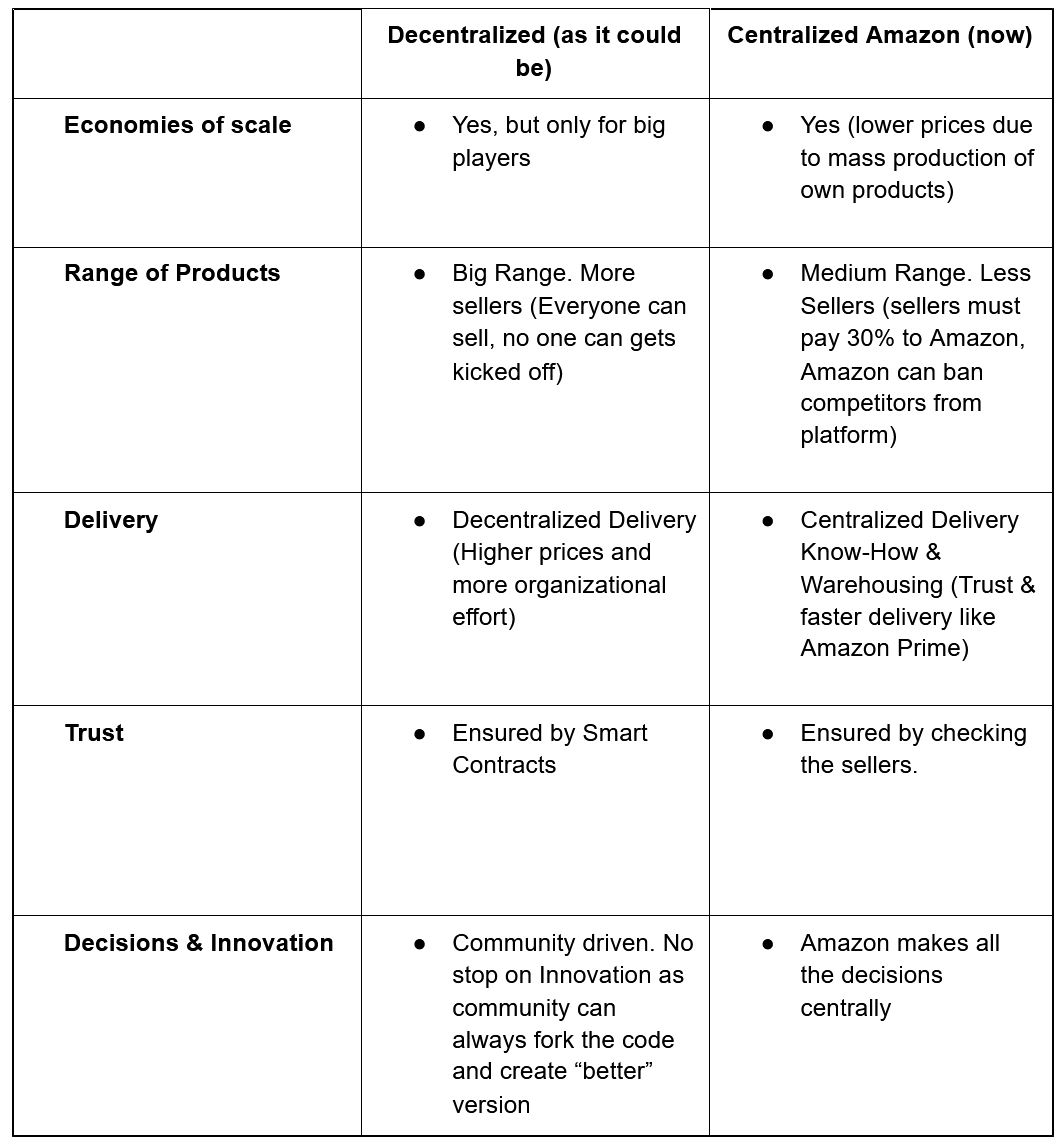
Let’s analyze the table:
- Economies of scale: No winner, possibile on both sides (thus no influence on price)
- Range of Products & Competition: Decentralization wins, as it can host more sellers and thus provide more products on the platform (price potentially lowered due to more competition)
- Delivery: Centralization wins, as the company has more know-how and economies of scale if it ships more products centralized (price is lowered due to smaller delivery costs)
- Trust: No winner, as 99% expect products from Amazon to arrive (thus no influence on trust or delivery)
- Decisions & Innovation: No Winner, I will come back to that later in Part 2.
Part 2: How will these new companies of decentralization (DAOs) operate?
As Jon nicely explained, a Decentralized Autonomous Organizations, is a new type of company:
“it's essentially a bag of smart contracts on the blockchain that let members (i.e., token holders) reach consensus and act collectively without knowing or caring about each other's real-world identities.”
So the main merit is that some collective action is happening. Basically the community decides together where the company is going and what the product will look like. What an interesting and COOL concept! However, as I was going down the rabbit hole, I was not really convinced that the current DAOs are really "living" what it means to be a DAO. Let me clarify;
As the founder of Compound (one of the bigger DAOs) explained, most DAOs have some kind of a centralized core team which actually builds around 95% of the product. Only smaller decisions/implementations are done by the decentralized DAO part aka. the user community. This also seemed to be true for other DAOs like UNISWAP, where UNISWAP controls most of the governance tokens .
So my question here is: How do today's DAOs really differ from traditional companies that have great user communities like LEGO?
As I started thinking about that, I found some articles that state that it is too early to say how DAOs will really function once they mature. The current way is what I call, Attention:
BUZZWORD: Centralized Decentralization. Sounds Good, eh?
This means that the founding team creates and launches the initial product, controls the decisions of the DAO, and (hopefully) gradually releases the DAO to the community. This is actually called “Exit to Community”:
It will be interesting to see how the “Exit to Community” actually works in reality, when more DAO's start doing that. Because the “Exit to Community” has not often happened yet, for the bigger DAO’s at least, let me first start with the questions on hiring and the real reasons why people join DAOs.
How does hiring really work by a DAO if it is completely decentralized and mostly pseudonymous. One example could be the one with the “online school” described in the article:
- Pseudonymous person has a skill certificate registered on the blockchain.
- The Person can apply for a microtask offered by a DAO.
- The person solves the task, gets the money and another proof on the chain.
- Why decentralization? Defi, Government, Commerce.
- What does decentralization mean in the real world? Why is decentralizing really better than centralization?
- What would be the GREAT benefit for the customer, if Amazon was decentralized? Why would someone switch to a decentralized platform rather than buy at Amazon.
- Are DAOs really “living” what it means to be a DAO currently?
- How do today's DAOs really differ from traditional companies that have great user communities like LEGO?
- How will DAOs work, once they mature?
- How does hiring really work by a DAO if it is completely decentralized and mostly pseudonymous?
- Do you need a monetary incentive for people to participate and grow the DAO, or can a big DAO survive just on pure will and collaboration?
- So is a decentralized structure of a DAO maybe actually counter-intuitive for innovation?
- If decentralized companies mostly have 2 sided markets with network effects, will there be a winner takes all dynamics and monopolies for first movers? (Youtube Link)
- Will there be an intellectual elite (whales & first movers) in control over these decentralized platforms with big token ownership due to greed?
- What will competition look like if everything is transparent and on the chain? Is this the end or the beginning of dirty tactics?
This example is great for microtasks, but what about tasks where you need top teams? Often, it needs a lot of persuasion and effort by the founders to get a top team together, because they are just hard to get. This might also be why founders spend most of their time in the beginning on hiring.
Currently I do not really know the answer. Some might argue that the DAO gives you ownership and thus you get incentivized to participate. Yes, but how does that really compete with the standard process right now where you get stock options and a great salary? It is definitely an interesting topic and I am curious how it will play out. I found a small thread on hiring in DAOs, so it is a nice start.
Another heated debate started in the comments during the DAO summit 2021 on Youtube . People were debating if contributors to DAO's do it for the "north star" aka. some kind of bigger purpose, or just out of monetary incentive that the token could be worth a lot of money someday.
It is also a difficult question, which I would like to discuss out of personal experience. I currently live in Austria. Austria has over 100000+ “Vereine” aka communities or clubs. I am currently participating in a "community-run" tennis club in Vienna (Circle 8) , where the broader core team is actually working for free. The principles are similar to a DAO, just that it is far from technical, not governed by a blockchain and local. However, I was surprised that we had similar problems like most of the DAOs in the summit, mainly governance. However, people issues also arise in terms of workload distribution and degrees of responsibility.
Some people want to be "led" and need a leader to really execute pressing issues. From experience I found that when people contribute for "free" they would rather pick the "nice work", and leave the more annoying parts to others. I also heard in the talks that DAO participants are gladly sharing ideas and want to decide on the direction of the DAO, however it sometimes lacks execution, as maybe the incentives are not big enough. We also experienced the same problems in the community driven club: ideas and project proposals "YES", who wants to execute these projects from A to Z - "Hmm, not me". Bigger organizations have money to hire and compensate people for the not so sexy jobs. Thus, these jobs still get executed, even though the people do not like the job. However, in the end execution is key for a DAO to survive...
These are also some numbers of the DAOs on DAOHAUS . Even though members are growing due to the current “hype”, voting participation is constantly falling. So do you need a monetary incentive for people to participate and grow the DAO, or can a big DAO survive just on pure will and collaboration?
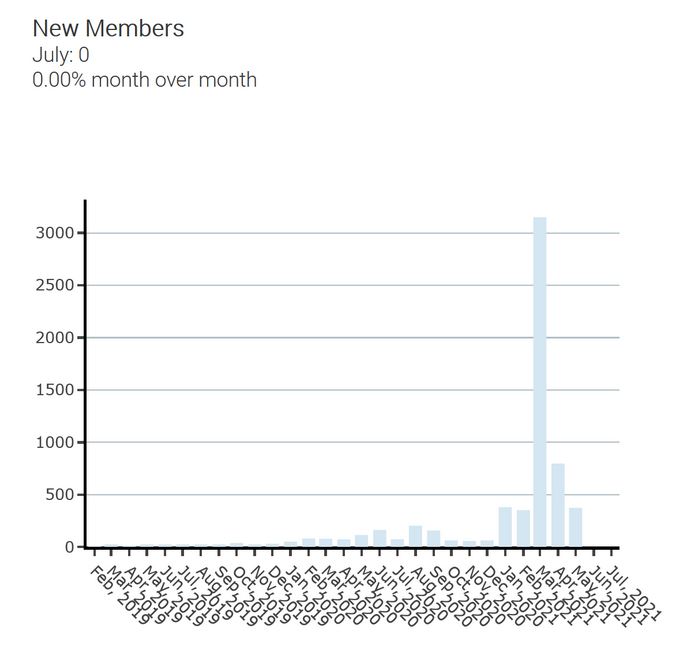
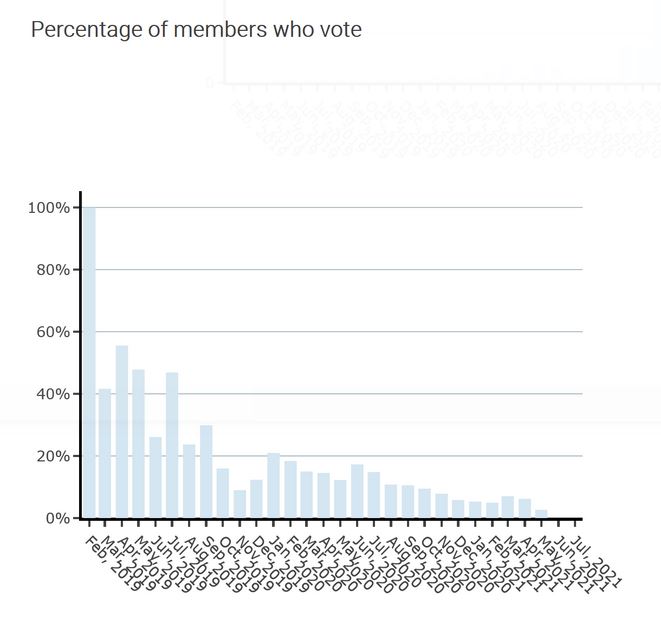
Part 3: Is the decentralized future bringing True Innovation or Death by Community?
DAOs are kind of portraying this image of an innovative structure where a lot of innovation MUST happen due to its original structure. However, I am not completely convinced. Even though community innovation is a big thing, it is mostly Lead Users who truly innovate. They are individuals who know what the next big thing will be. Something like contrarians, who turn out to be correct.
Is the decentralized community maybe a hindrance for true innovation? Let me start with my personal story from the community club again. We have a complete voting democracy, however the majority almost never approves rather “innovative” ideas. I believe that can easily be explained with Roger’s innovation curve that shows that most people are not innovative. Thus, most of the people anonymously vote against innovation to “play it safe”. This is also the reason why the Innovation Departments are most of the time not fully integrated in companies, as they feel strong push-back.
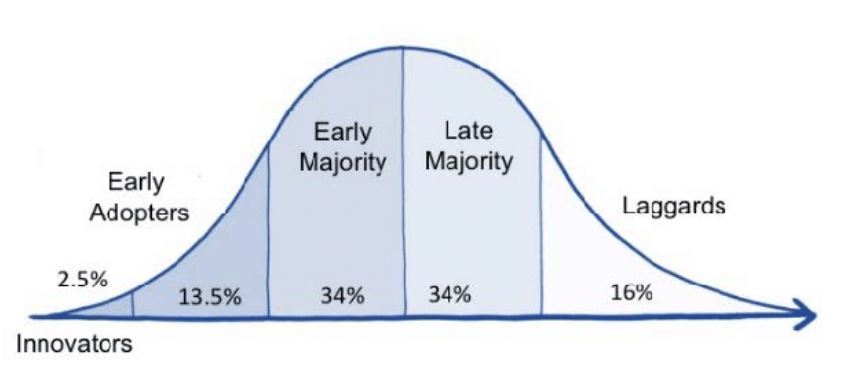
Henry Ford kind of sums up my point: “If I had asked people what they wanted, they would have said faster horses”. Elon Musk would have a hard time pushing through with the Cybertruck, as people did not think it would be feasible. Steve Jobs would have never built revolutionary products, as most of the people do not believe in it. Thus, the last thing and potentially most important thing I am asking myself is: Could a decentralized structure of a DAO maybe actually be counter-intuitive for innovation?
All in all, the article of Joe Stokes really helped me to start questioning and digging deeper into these super exciting topics. Maybe my reasoning has holes, maybe I missed some concepts completely, but I started to level up from my normie status. I hope once you read Joe's article, you will also embrace this journey into a changed world by crypto.
Appendix:
A quick overview about the main questions I posed:
Additional Questions: